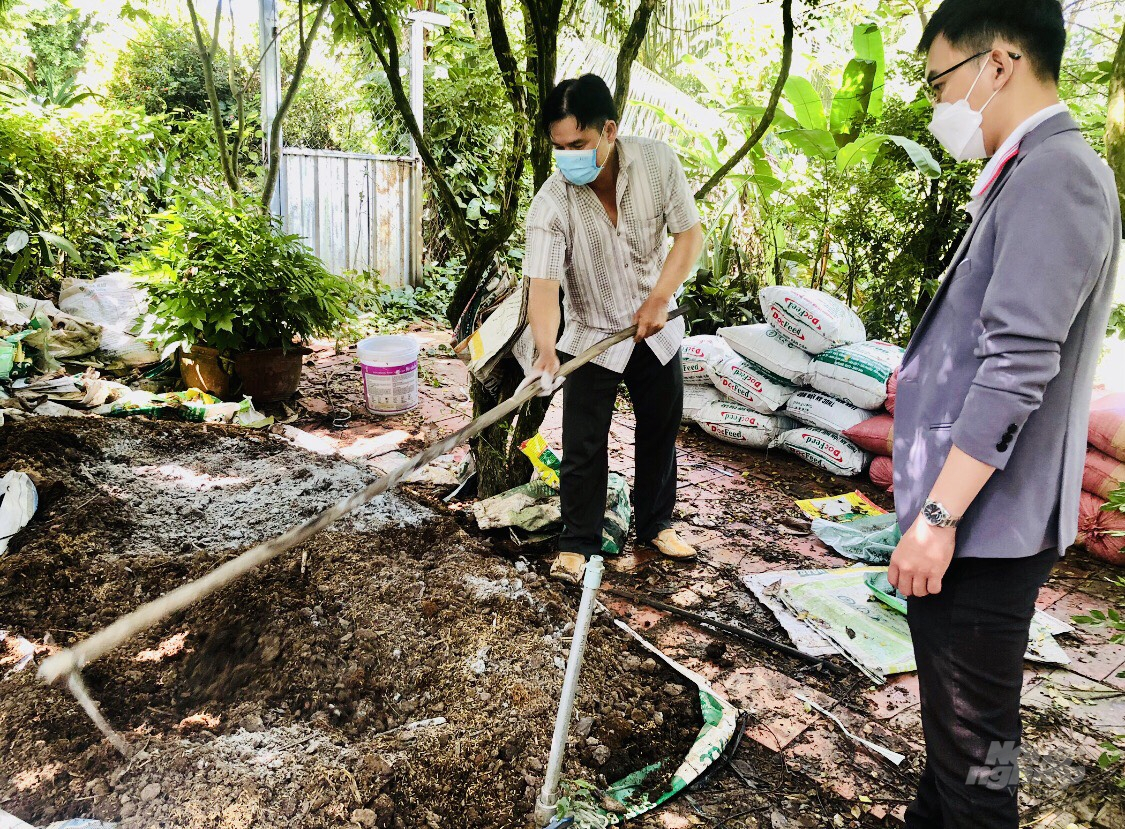With a large source of by-products, businesses can increase their organic fertilizer production from 4 million tons/year to 10 million tons/year, and farmers can also produce tens of millions of tons/year.
Most of the by-products are underutilized
According to the General Statistics Office, the total volume of by-products in 2020 across the country is about more than 156 million tons, including: 88.9 million tons of by-products after harvesting from crops and processing agricultural products. of crop production (accounting for 56.7%); 61.4 million tons of cattle and poultry manure from the livestock industry (accounting for 39.1%); 5.5 million tons from the forestry sector (accounting for 3.5%) and about 1 million tons from the fisheries sector (10.6%).

The results of the studies show that the amount of crop residues has high nutritional value (45 – 70% of total digestible nutrients) and has the ability to provide a large amount of calories (1662 – 2549kcal/kg dry matter). Therefore, if appropriate technologies are applied, crop by-products will become valuable livestock products, nutrients for the soil and environmental protection. However, at present, only about 10% of the crop by-products are used as fuel on the spot such as in brick kilns, cooking, 5% as industrial fuel, 3% as animal feed, etc. Most of the by-products have not been used and are discharged directly into the environment or burned, causing environmental pollution and flow blockage.
Faced with that fact, over the past time, many domestic enterprises have stepped in to research and find technologies to treat agricultural by-products, many methods have been born such as coal production, bio-oil. , energy, airgel materials, batteries from rice husks; building materials; composite compost; growing mushrooms, reishi; handicrafts; livestock wastewater treatment… In which, there is the application of biotechnology to treat agricultural by-products.
Mr. Pham Xuan Hung, Director of Phuong Nam Agricultural Development Co., Ltd. said: “The difficulty in handling is that fresh straw contains a lot of cellulose fiber which is hard to decay, has a long decomposition time in the soil, so it is replaceable. Nutrient sources such as manure are limited. In addition, because it is not completely decomposed, it causes difficulties in tilling the soil after the crop, and the risk of the appearance of pathogenic microorganisms in the plant’s root zone. So when plowing, burying straw in the ground must at least after 30-40 days to transplant (sowing) safely. Therefore, farmers still choose to burn as the main solution.

Since 2012, Phuong Nam Company has started to research microbiological products to serve agricultural production, including Sumitri preparations. Thanks to participating in the incubation and cooperation course at the High-Tech Agricultural Park of Ho Chi Minh City (AHTP), the microbial product Sumitri researched by him and his team is different from other products such as: Sources of microorganisms are isolated and preserved in an optimal environment, so they keep their biological activity sustainably.
Microbial products are cultured according to spore separation technology, so they have very good performance and long-term preservation. In addition, the product includes many strains of integrated microorganisms, which can operate in both aerobic and anaerobic conditions, so it is suitable for the conditions of production practice.
Can produce tens of millions of tons of organic fertilizer/year
According to Mr. Pham Xuan Hung, because the microorganisms in the “biological products” are activated immediately after being released into the environment, organic substances are quickly decomposed (straw takes only 7-10 days, normally takes more than 30-40 days). Therefore, saving from 20-30% of fertilizer for the next rice crop. At the same time, reduce the amount of pesticides from 3-4 times/crop, increase economic efficiency from 4-6 million/ha. In addition, microorganisms can work in alum and salty water conditions, so they can decompose straw and stubble into a food source for shrimp after harvesting rice in rice-shrimp farming. In addition, the product can also be used to compost organic fertilizers from crop residues such as dragon fruit stems, corn, potatoes, coffee skins, etc. with a very fast incubation time.

Sumitri is very easy to use, just using 125g of the product can mix fertilizers, spread evenly on the 360-500m2 pole of the field right after the first stamping, without much labor. The product will quickly decompose organic substances such as straw, rice straw, animal carcasses, plants, agricultural waste … into humus, nutrients (fertilizers) to help plants easily absorb, limit the phenomenon of poisoning organic matter, rice plants do not yellow leaves, choking roots. The plant’s root system develops well, the plant grows and develops well. The development of organic agriculture in recent years has received great attention from the Ministry of Agriculture and Rural Development as well as the government and is encouraging farmers in agricultural production areas to do so.
“Since the establishment of the company, we have researched microbiological products to serve agricultural production and in accordance with the current trend. In particular, the line of microbiological products for production in cultivation, husbandry and aquaculture is clean, safe and meets the standards of VietGAP, GobalGAP as well as organic products. Microbiological products Sumitri are currently being consumed in many provinces and cities across the country”, Mr. Hung shared.
According to Mr. Hung, up to now, the Company’s “Sumitri” product has only met 1-2% of the rice production area nationwide used for composting rice straw as fertilizer. Hopefully in the near future, the Company will continue to accompany localities in the treatment of rice straw in particular and agricultural by-products in general into fertilizer.

Talking about this issue, Dr. Mai Thanh Phung, Vice President of the Vietnam Association of Farms and Agribusinesses, and Vice President of the Vietnam Horticultural Association suggested: It is necessary to promote communication to help farmers. and businesses step in, turning agricultural by-products into organic fertilizers, reducing dependence on imported sources. However, it is necessary to guide farmers to know what by-products they have, what process to perform for processing, what can be used for effective purposes…
According to Dr. Phung, if done well, it is possible to increase the production of organic fertilizers of current enterprises from 4 million tons/year to 10 million tons/year. At the same time, farmers can also produce organic fertilizers with an output of tens of millions of tons per year.
Source: https://nongnghiep.vn/tao-nguon-loi-khong-lo-tu-phu-pham-nong-nghiep-d311595.html





Leave a reply